|
|
ADDRESS AT THE INAUGURATION OF THE DR. B.P. PAL BIRTH CENTENARY SYMPOSIUM ON 'SEARCH FOR NEW GENES', NATIONAL AGRICULTURE SCIENCE CENTRE COMPLEX, NEW DELHI
01-09-2006 : New Delhi
Impact of Gene Science in Agriculture
I am happy to participate in the inauguration of symposium on "Search of New Genes" in honor of Dr. B.P. Pal birth centenary. Dr. B.P. Pal, a legend of the Indian Agriculture Research System was born in 1906 in Punjab, educated in Myanmar and served most of his career at the Indian Agriculture Research Institute (IARI), Pusa, New Delhi and the Indian Council of Agriculture Research (ICAR). He had unique qualities of an able Administrator, Painter, Lover of music, a Philosopher, a humanist and above all a Professional Plant Breeder. His contribution in the field of developing rust resistant varieties of Wheat and different kinds of Roses are acknowledged world over. He is also known as "Father of Roses in India". One of his most famous writings is "Search for New Genes", which directed development of Indian Agriculture Research System and establishment of National Bureau of Plant Genetic Resources which I have visited in 1997 and seen the large collection of seeds and plant tissues. Dr. Pal?s paper on "Search for New Genes" written in 1934 turned out to be a vision for gene research. Utilization of plant genetic resources for agricultural developments has been recognized and several bureaus on plant genetic resources have been established. The food system world over uses plant genes as a means to provide quality food. To commemorate his birth century the present symposium on Search for New Genes is timely and befitting. I am privileged to participate in this symposium. The Nation is grateful to Dr. B.P. Pal for his contribution to Indian Agriculture Research and Development.
While preparing for this talk, I happened to find the question asked by the editors of science, celebrating the inauguration of the developmental biology by Wilhelm Roux a century earlier, in the book Consilience The Unity of Knowledge by Edward O. Wilson. They asked one hundred contemporary researchers in the filed of biology to identify what they consider crucial unanswered questions in the discipline. The responses from the scientists were (1) the molecular mechanisms of tissue and organ development (2) The connection between development and genetic evolution (3) The steps by which cells become committed to a particular fate (4) The role of cell-to-cell signaling in tissue development and few more. These subjects are the study of research even today. Now, I would like to share with you few thoughts on "Impact of Gene Science in Agriculture".
Genes 1934
When Dr. Pal wrote the article "Search for New Genes", our knowledge of genes was limited to the extent that genes were known as physical unit having fixed position, arranged in linear order on hereditary material (Chromosome) and affected by environmental factors. Genes were thought of proteins in 1934. Number of genes in an organism was also presumed which later on came out to be nearer to the presumption. Crop varieties were being selected or bred on presumption of possession of certain genes in a crop. Those presumptions were also proved to be right and paid the dividend to the humanity.

Present Knowledge of genes
Since 1934, there has been a rapid progress in science pertaining to natural genetic material and its establishment as DNA or RNA. Now genes can be located by using markers and also linear order of genes on the genetic material can be determined. Genes can be multiplied and they can be arranged in a particular order. Complete genomes of several bacteria, plants, animals including human (Human Genome Programme) have been sequenced. Rice plant has been sequenced. The concept of conventional genes has been fine tuned and refined having sub units of genes as promoter, enhancer and suppressor. Chemical synthesis of genes with novel properties have become a common practice. Transfer of genes from one species to another has become easy. Present day biotechnology and bio-informatics tools have become important in discovery, synthesis and utilization of purposeful genes. Since exploitation of genes for improvement of crop for the benefit of society has become a common practice, I feel the search for new genes would always be there to meet urgent and important changing needs of the society. Agricultural Scientists would continue to serve the society with the help of newer genes. Physiological studies on a model plant Arabidopsis brings out that this plant has 25,498 genes. From this study, it is expected that the number of genes which may be applicable to plant life will be around 35,000. In these genes the house keeping genes will be common to plants, animals and bacteria. And other genes will be group specific.
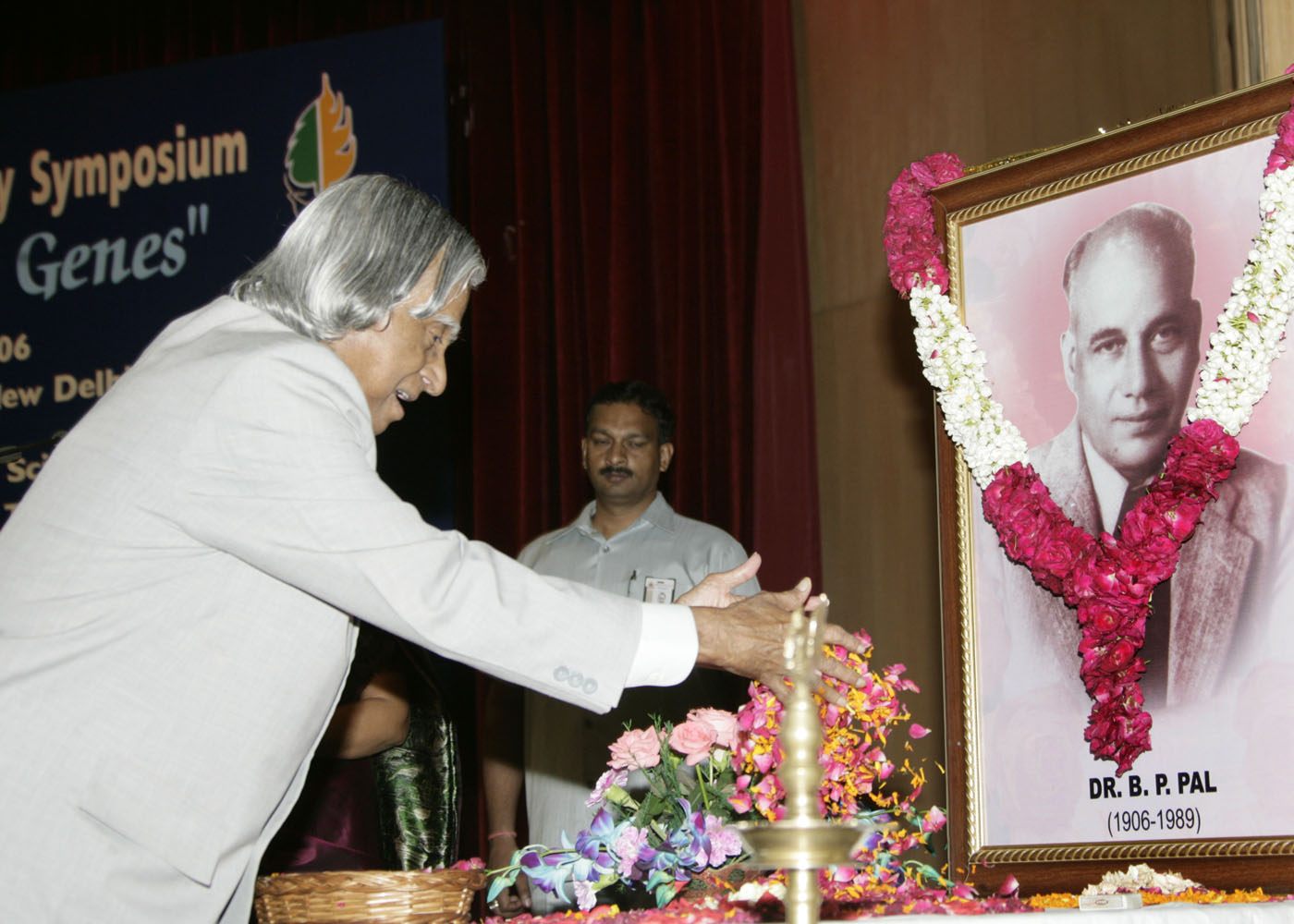

Plant Genome Research
When I inaugurated the National Centre of Plant Genome Research Centre, New Delhi, I found that they had undertaken an important programme on nutritional enhancement of Potato under its Nutritional Genomic Programme. The Centre has also made satisfactory progress in cloning of D-manno-sidose gene from capsicum and tomato. Another important area pursued by the institute in producing low oxalate vegetables and other crops such as tomato, spinach and other crops like soybean and groundnut, will have an impact on the revenue generation capability of our farmers.
Now I would like to suggest agricultural scientists gathered here to consider the search of new genes for the following:

Stresses
Country is facing problems of frequent drought conditions, low temperature spells and lot of salt affected areas. There is need to search for genes to overcome these problems by developing stress tolerant crop varieties. There are host of plant diseases and insects. The pest resistant genes for various biotic stresses can be a big boon to the farmers and boost agriculture production substantially. For example, the research group under the leadership of Prof. K. Veluthambi at the Centre for Plant Molecular Biology, Madurai, Kamaraj University has identified 3 anti-fungal genes. This group has developed 30 transgenic rice lines using these genes which overcomes rice blast disease and sheath blight disease. This work is an example of how modern tools of gene science can solve biotic stress by developing high yield disease and insect resistant crops. Dr. Pal did similar work and developed rust-resistant varieties of wheat without techniques available in present day molecular biology.
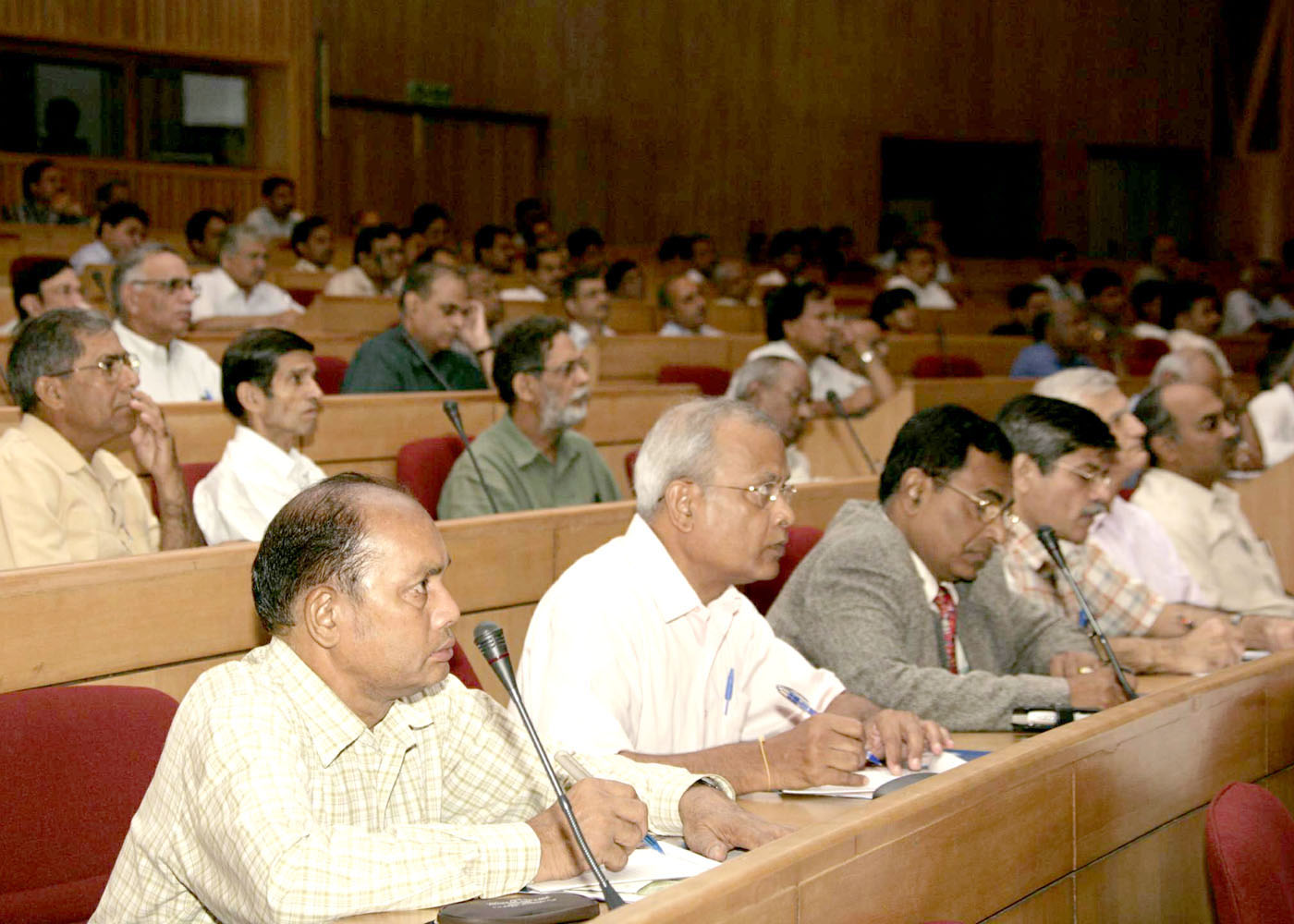

Bio-factories
'Plant Genomics' is the new emerging area of research, which deals with functional and structural definition of genes both in terms of their location in the genome and their expression for defining the precise regulation to control the whole metabolism. Thus this field opens up new avenues to modulate the gene expression in such a way that plants can be converted into proficient genotypes or varieties to be used as the bio-factories producing useful proteins, therapeutic molecules, nutritional compositions, and stress tolerant varieties to meet the current and futuristic requirement of the society in eco-environment friendly manner.
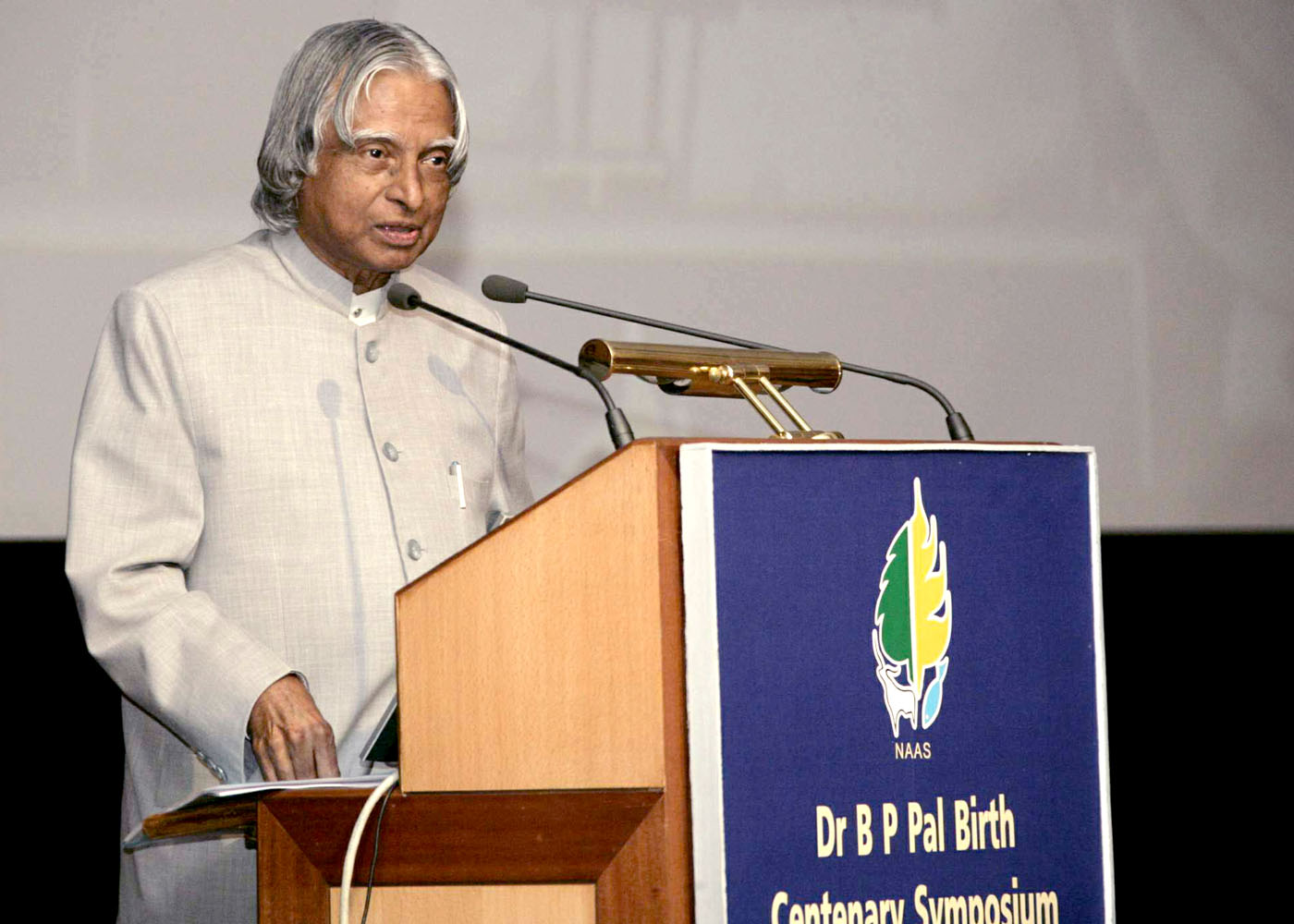

Nutrition
While discussing with the nutritional specialists, I realize that the population in the country suffers from deficiencies of Vitamin A, Iodine, Calcium and Iron. This is true for Women in general and particularly in rural populace leading to unacceptable levels of infant and maternal mortality rate. Supplementation of diet with these nutrients is a problem. If crops or crop varieties rich in Vitamin A, Iodine, Calcium and Iron can be developed by incorporating appropriate genes, this nutrition deficiency problem can be minimized. One of the Indian examples of the leadership in this field has been accomplished by Dr. Asish Dutta and his team in isolating and characterizing the perfect protein gene ?Ama? from Amaranthus, the plant as a source of grains (Ramdana used traditionally in India for fasting by the women). The perfection on this protein is in terms of amino acid composition that combines qualities of both cereals and pulses in one grain and hence providing the opportunity to take care of protein mal-nutrition in Indian population. This gene now has been cloned and expressed even in potato to make it a better nutritional source combining starch and protein. This opens up the opportunities for evolving novel food crops of the future.

Productivity and Value addition
For the country to be competitive in the international market higher return per unit input in farming has become mandatory. Indian crops are known to have poor productivity. In my opinion search for genes for higher productivity can help the nation to a very large extent.
It is necessary to add value to the agriculture produce to ensure adequate return to the growers. Genes can play a very great role in value addition to agriculture crops particularly the vegetables, fruits, flowers and other perishables since they have to reach the market and kitchen which are substantially far off from the farm. This value addition could be in the form of extension of shelf life of horticulture produce by exploiting appropriate genes. This combined with food processing can save the nation 25-35% of the crop losses in Horticulture.
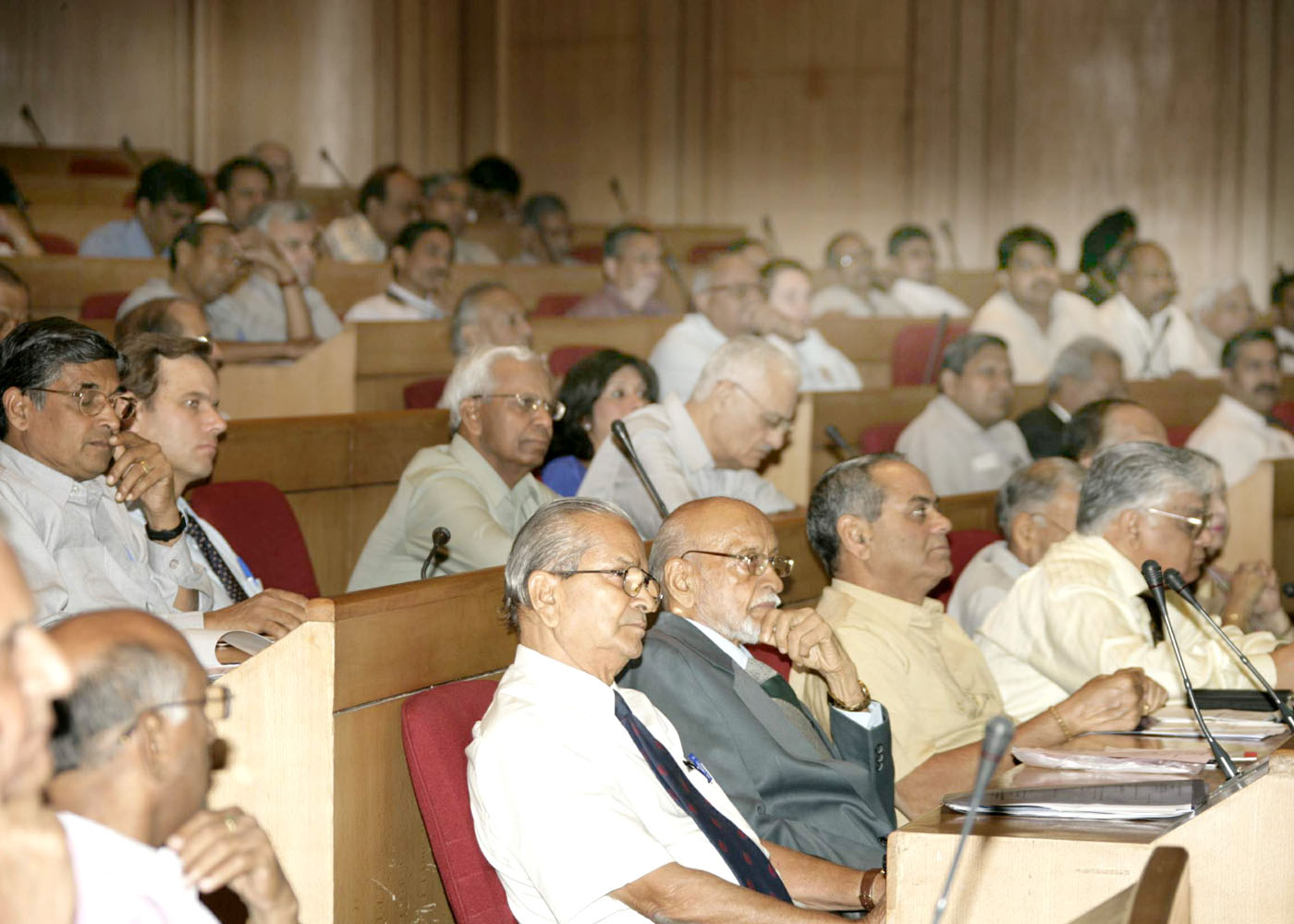

Bio-fuels
There is a continuous reduction in the reserve of fossil fuel in the planet. India produces only 25% of its total requirement and our import bill for fossil fuels has already touched Rs. 1,50,000 Cr. Hence, we have to look for alternative fuels with utmost speed. Among the alternatives bio-fuel crops such as Jatropha is considered a potential crop suitable for the diverse agro climatic condition of the country. To my knowledge this crop needs help of new genes to make it yield early and provide higher productivity in terms of seed and oil percentage. We have a target of achieving 60 million tonnes of bio-diesel per annum to be produced in the country before 2030 for realizing energy independence. This can be achieved if we can evolve a seed which will provide minimum 3 kgs of seed per plant annually commencing from third year of plantation and minimum 40% oil content. I consider, this is definitely an important challenge for the agriculture scientists, gene experts, plant breeders, biotechnologists and others participants of this symposium.

Development of Designer Crops
Relating the 'genome' of the plant with 'metabolome' is the emerging field of functional genomics, a successor of gene, which finds large scale application in medicinal and aromatic plants to develop designer crops which will specifically produce the drug molecules and accumulate them in large quantities for use by pharma industry.
Central Institute of Medicinal and Aromatic Plants (CIMAP) at Lucknow is working on the functional genomics research for highly important plants like anticancer plant Catha-ran-thus rose-us (Periwinkle), anti-malarial plant Arte-misia annua (Quinghao), pain therapeutics yielding plant Papa-ver som-ni-ferum (Opium poppy), revitalizing immuno-modulator plant Witha-nia somni-fera (Ashwagandha), traditionally most valued aromatic-cum-medicinal plant Oci-mum (Tulsi) and the mint yielding aromatic plant Mentha ar-ven-sis (Menthol mint), the plant which has also created history to place India on the top position for production and export of menthol competitively in the global market. I would suggest a collaborative multi-institutional projects on medicinal and aromatic plants to evolve new varieties with high value addition.
CIMAP has also dissected out the genomic component of Mentha arvensis and Mentha piperita, and isolated the genes responsible for key regulation in its pathway not only to produce larger amount of menthol but also for producing designer mints with variety of aromatic flavours useful right from confectionary to pharmaceutical purposes. The results will be of assistance to the farmers.
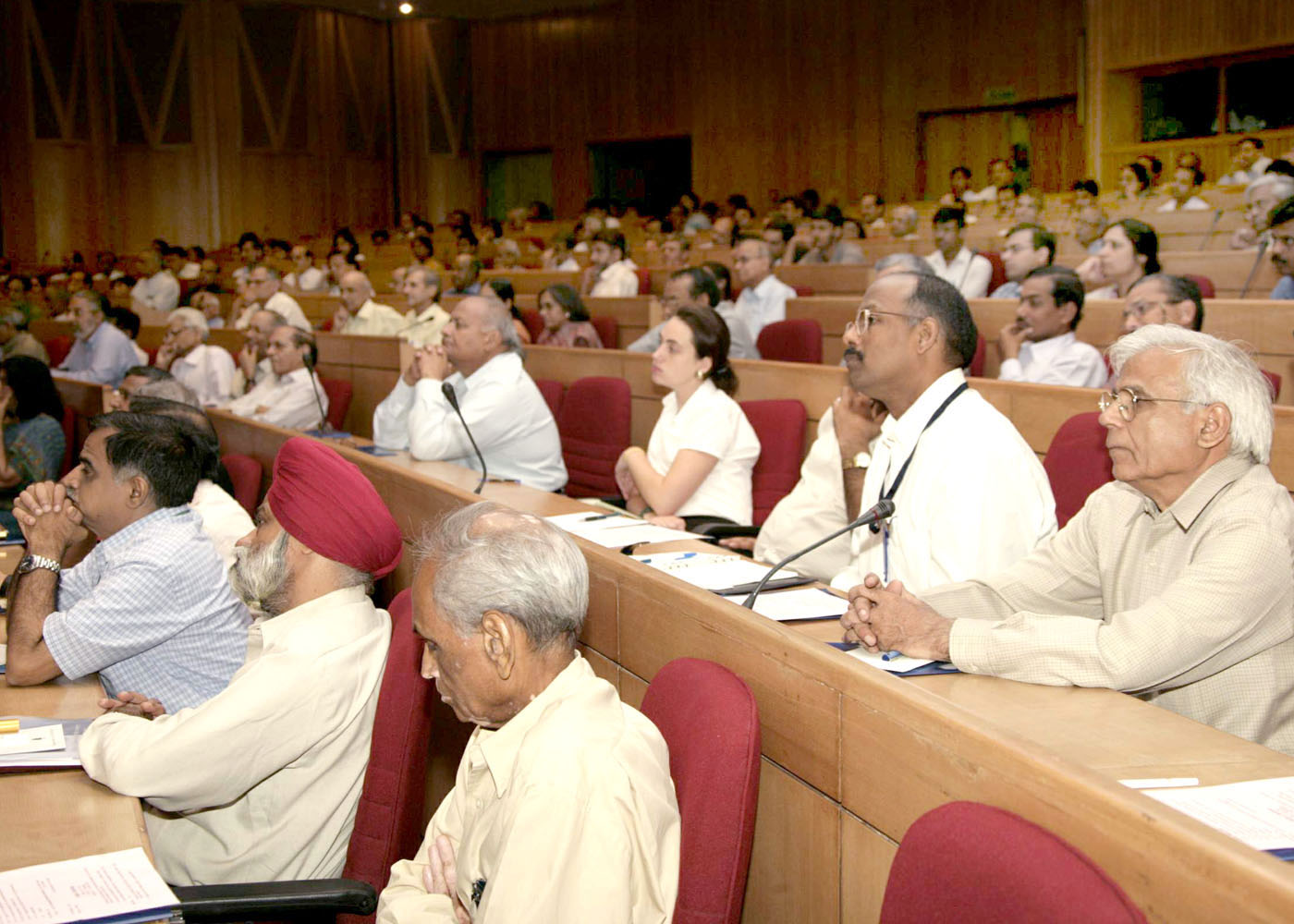
Microbial Genes: Microbes are very useful in maintaining soil health and yielding food products for human being. They possess useful genes. These can be exploited by transferring them to desirable crops and providing their own quality produce like mushrooms, bio-fertilizers, bio-pesticides and algae.
Sugarcane: India is the second largest producer of sugar in the world next to Brazil. We produce 360 million tonnes of sugarcane per year. The research has been conducted by Vasantdada Sugar Institute in the following areas: (a) reduction of water required for cultivation (b) reduction of growth cycle (c) minimizing the cost of input for sugarcane cultivation and also sugar production (d) regulated growth cycle of sugarcane so that sugarcane industries can get continuous supply of sugarcane.
Genetic engineering research has been intensified on molecular characterization of the sugarcane genome, molecular diagnosis of diseases and molecular biology of sugarcane pathogens and nitrogen fixing micro-organisms. The molecular characterization of sugarcane genome has enabled early selection of desirable plants in the breeding programme on the basis of molecular markers. Molecular characterization of the disease causing organisms like viruses have enabled in controlling the diseases. Development of higher nitrogen fixing microbes has been useful in sustainable and low cost sugarcane production. I have witnessed the results based on the research conducted by Vasantdada Sugar Institute, Pune which has enabled the farmers to increase the yield of sugarcane from 69 tonnes per hectare to nearly 94 tonnes per hectare in Maharashtra. The agricultural scientists, agriculture extension workers and the farmers have to work together to further increase the yield and also ensure that what has been proved in a limited area is scalable in different parts of the country without loss of productivity and quality.

Challenges and Opportunities in Genomic Research
As discussed earlier, there are enormous challenges and opportunities for plant science laboratories of the country on genomics research with defined targets which could range from nutraceutical crops rich in vitamins or essential amino acids, medicinal crops for fighting various diseases, making hill crop to grow in plains and vice-versa, enhancing yield of food crops several folds, disease and pest resistant crops or crops that can tolerate weather extremities like drought, flood, salinity, scorching heat, low temperature frost and so on. Crop varieties responding to organic mode of cultivation if can be developed using knowledge of plant genome would lead to great service to the humanity environment and soil health.


Conclusion
Nobel Laureate Prof. Norman E Borlaug, a well known agricultural scientist and a partner in India's first Green revolution was receiving MS. Swaminathan Award, at Vigyan Bhavan, New Delhi on the 15th of March 2005. Prof. Borlaug, at the age of 91, was in the midst of all the praise showered on him from everybody gathered there. When his turn came, he got up and highlighted India's advancement in the agricultural science and production and said that the political visionary Shri C. Subramaniam and Dr. M S Swaminathan were the prime architects of First Green Revolution in India. He also recalled with pride, Dr. Verghese Kurien who ushered White Revolution in India. Then the surprise came. He turned to scientists sitting in the third row, fifth row and eighth row of the audience. He identified Dr. Raja Ram, a wheat specialist, Dr S K Vasal, a maize specialist, Dr. B. R. Barwale, a seed specialist. He said, all these scientists had contributed for India?s and Asia?s agricultural science. Dr. Borlaug introduced them to the audience by asking them to stand and ensured that the audience cheered and greeted the scientists with great enthusiasm. This scene I have not witnessed in our country before. This action of Dr. Norman Borlaug, I call it as a Scientific Magnanimity. Friends, if you aspire to achieve great things in life, you need Scientific Magnanimity. It is my experience that great mind and great heart go together. This Scientific Magnanimity will motivate the scientific community and nurture team spirit and lead to newer discoveries and innovation in plant genome research.
I am happy to inaugurate the symposium on "Search of New Genes" in honor of Dr. B.P. Pal's Centenary Celebrations and wish the participants all success in their mission of taking the fruits of gene science for agriculture leading to societal transformation.
May God bless you.
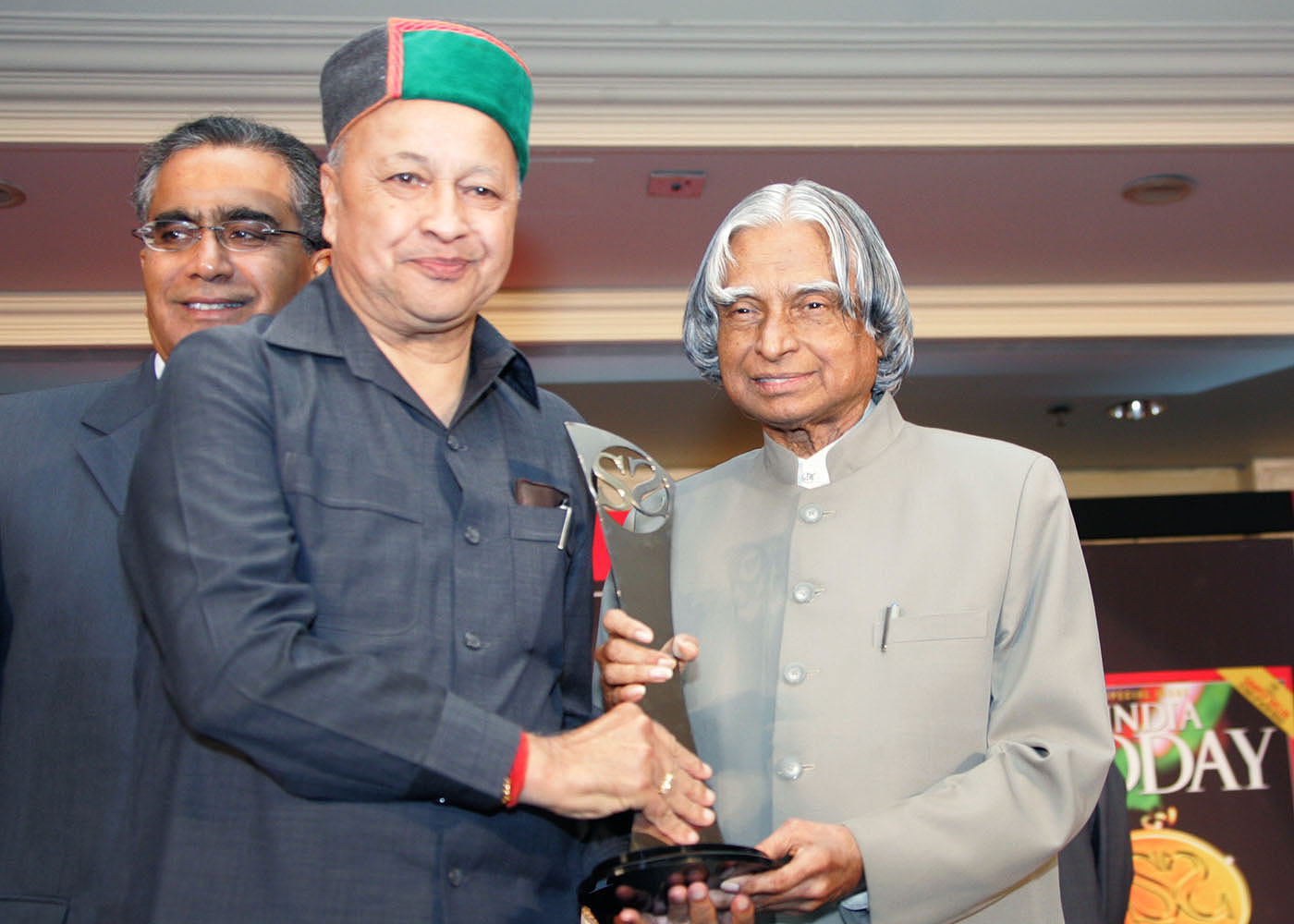
<<Back
|
|